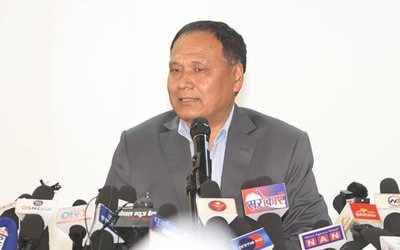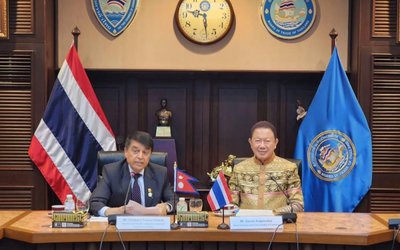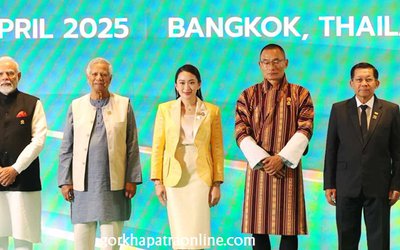More on Economy





When the International Labour Organization established its office in Nepal fifty years ago, Nepal was just at an infant stage of development and industrialisation and labour right was relatively unknown.
As ILO started work in Nepal, there was no respect for work and dignity of workers. However, the situation has changed now. The rights of workers have been well established and protected by the laws and constitution of Nepal.
Since joining ILO, Nepal has signed several of its charters, expressing commitment to the dignity and respect of workers as well as other aspects for the wellbeing of the class.
Out of eight core ILO conventions on international labour standards and labour rights, Nepal has so far ratified seven conventions. “The unique tripartite structure of ILO comprising representatives from the government, employers and employees makes me feel proud that we are jointly embracing the notion of decent work for all,” said Prime Minister Pushpa Kamal Dahal. “I am happy that this special occasion is marked in the presence of Director General Guy Ryder here in Kathmandu.”
Although ILO has been involved in various other sectors of Nepal’s development process, people see ILO as an institution synonymous to an organisation to establish the rights of workers.
In the last few years, Nepal has made great efforts in promoting decent work, developing harmonious labour relations and ensuring social justice.
“Our national development plans, labour laws, social protection rules and regulations and national employment policy are directed towards promoting decent jobs, strengthening orderly, skilled and safe foreign employment, and creating productive and new employment opportunities at home,” said Prime Minister Dahal.
ILO Director-General Guy Ryder came to Nepal to join ILO-Nepal for the 50 years' partnership program.
Along with the chief guest of the program, prime minister Pushpa Kamal Dahal Prachanda, ILO Director-General Guy Ryder released a book on 50th anniversary of the ILO-Nepal partnership.
During his visit, Director-General of the International Labour Organization (ILO) Guy Ryder also met Minister for Labour and Employment, Surya Man Gurung.
During the meeting, the two agreed to forge a common viewpoint on the international issues. Ryder also lauded Nepal's efforts to ensure safety and regulations for labour sector of the country.
In a bid to make foreign employment sector safe, he suggested to prioritize labour agreement with the labour contributing countries.
Director-General Ryder extended gratitude to Nepal for remaining signatory to various conventions and resolutions of the ILO and expressed his confidence that it would also sign in the other important ILO convention.
The International Labour Organization (ILO) — the United Nations’ specialized body dealing with labour issues, particularly international labour standards, social protection, and work opportunities for all — has said that it will intensify cooperation with Nepal in the days to come as the country comes out of a long political transition through the promulgation of the new Constitution and is moving towards economic prosperity.
On the occasion of 50 years of cooperation with Nepal, ILO has set its sight on supporting the country’s progress on the path of decent job creation within the country.
Addressing a press conference, the visiting dignitary said that ILO is willing to provide extensive support to Nepal to implement the Employment Policy-2014. “We have the expertise working with the government to realise the objectives envisioned in the policy.”
He said that Nepal, as a young populous country, should take advantage of its burgeoning population for the rapid development of the country. “The enormous job opportunities in the country through harnessing potential in tourism, hydroelectricity development and physical infrastructure, among others could make migration a choice for individuals rather than a compulsion.”
Emphasizing on fair, transparent recruitment system in the labour recipient countries, Ryder said that the governing board of the ILO has adopted the fair recruitment guidelines in November after holding a series of negotiations with member countries (particularly, labour sending and labour recipient countries), to make the recruitment system transparent and ensure the rights of the migrant workers are respected. Though the guideline is voluntary, it will make the labour recipient countries more responsible in ensuring decent working environment, he said.
Apart from the government, ILO has been working with trade unions and employers (private sector) to ensure decent jobs, which is one of the 17 goals for sustainable development that the United Nations member countries have adopted, according to him.
As technological advancement has been leading the world towards ‘technological determinism’, which is assumed to destroy job opportunities for humans, Ryder believes that technology should be utilized for the betterment of the society.
United Nations Resident Coordinator Valerie Julliand also addressed the program. Secretary of Ministry of Labour and Employment Laxman Mainali and senior vice president of FNCCI Bhavani Rana signed the declaration for dignity in work place.
“I think we have the building blocks firmly in place to address these challenges. Our past 50 years of collaboration shows this very clearly. So let me conclude with my main message that the ILO will continue to stand by you in firm partnership, and together we will achieve social justice for all,” said Ryder.





